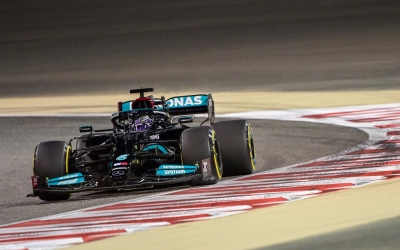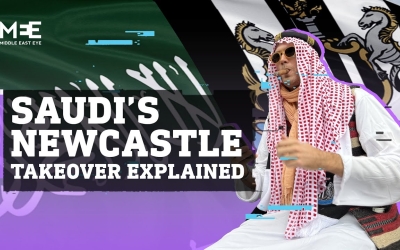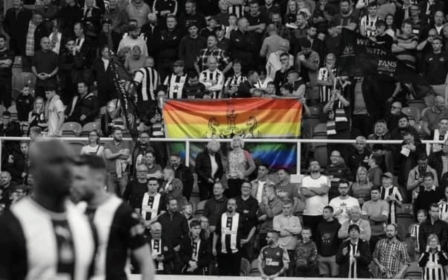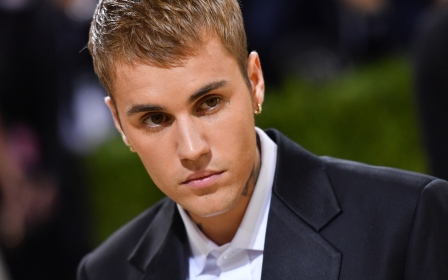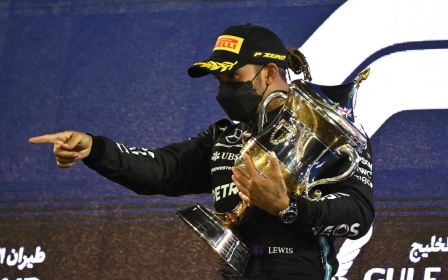Formula 1: Lewis Hamilton urged to raise human rights concerns in Saudi Arabia
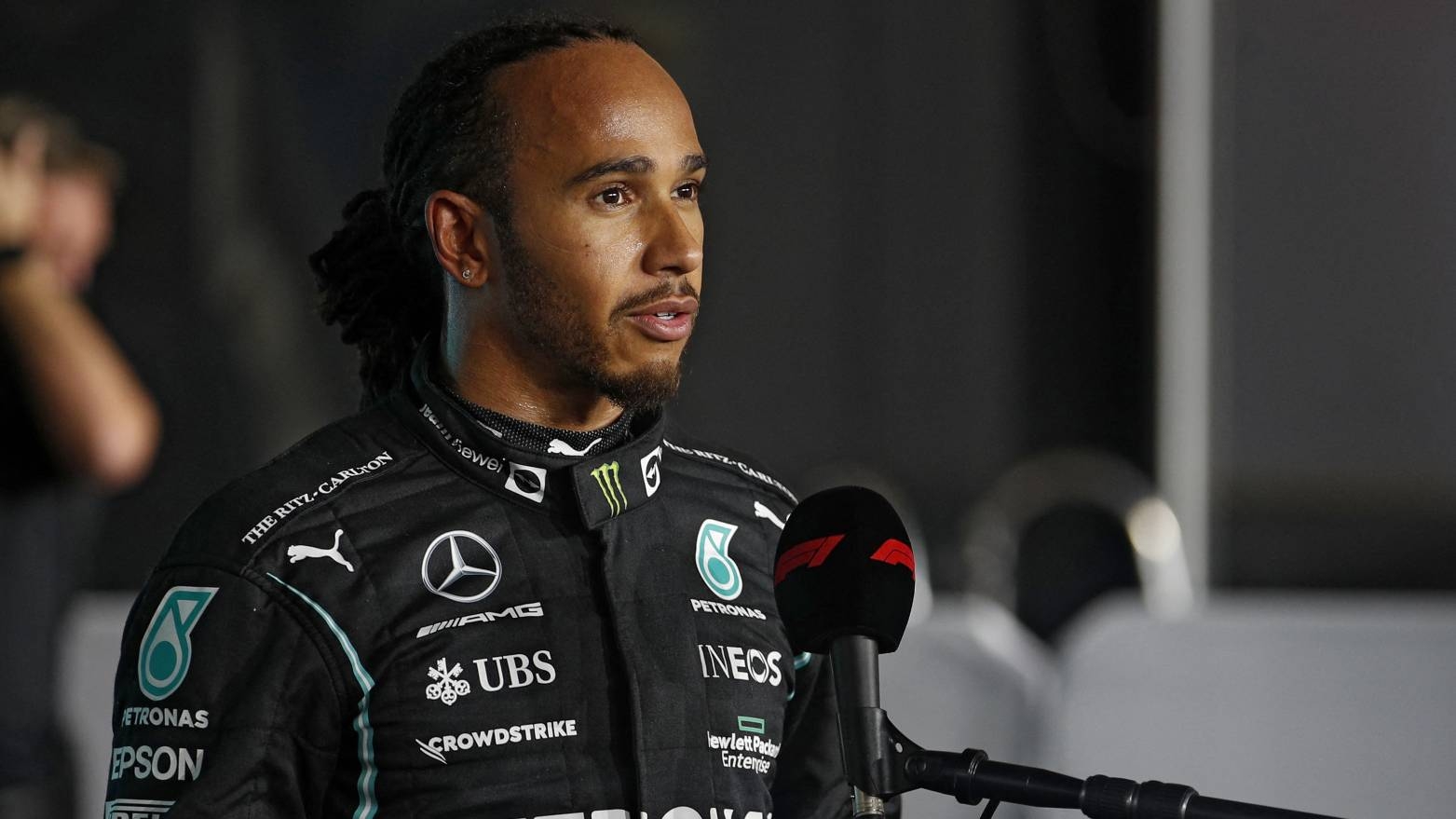
More than 40 organisations have called on Formula One driver Lewis Hamilton to address a number of human rights concerns with the president of the Saudi Automobile and Motorcycle Federation, ahead of the kingdom's first race this month.
In a letter shared with Middle East Eye, the groups thanked Hamilton for his remarks in November, when he said that as the auto racing sport comes to countries such as Saudi Arabia or Qatar, Formula One is "duty-bound" to raise awareness over human rights issues.
'Mr Hamilton, we believe there are many ways for you to make a statement while still being involved in the Saudi Grand Prix'
- Letter to Lewis Hamilton, Formula One driver
"We hope you choose to continue your brave advocacy in Formula 1 and speak out on the human rights issues taking place in the countries where the sport decides to go," the letter said.
The letter's signatories include ALQST; the Bahrain Institute for Rights and Democracy; Code Pink; Democracy for the Arab World Now (DAWN); Freedom First; Gulf Centre for Human Rights; and #FreeLoujain campaign group.
Danaka Katovich, a national organiser with Code Pink, said that "Lewis Hamilton has a unique opportunity" in Saudi Arabia.
New MEE newsletter: Jerusalem Dispatch
Sign up to get the latest insights and analysis on Israel-Palestine, alongside Turkey Unpacked and other MEE newsletters
"This event is intended to be a distraction from the Saudi government’s war crimes, but if the star of the sport is calling direct attention to it, people won’t be able to look away," she said in a statement shared with MEE.
In July, Prince Khalid Bin Sultan al-Faisal, chairman of the Saudi Automobile and Motorcycle Federation, said he would be happy to meet with Hamilton, a seven-time world champion in the sport, to allay concerns over Riyadh's human rights record.
The groups said in their letter that Hamilton should use this meeting to address key issues in the kingdom, including women's rights, the plight of migrant workers, prisoners of conscience, the war in Yemen, and democracy in the country.
"Mr Hamilton, we believe there are many ways for you to make a statement while still being involved in the Saudi Grand Prix," the letter said.
'Hold the sport more accountable'
Formula One (F1) and Saudi Arabia recently struck a 10-year deal, which will see the country host its first Grand Prix in Jeddah on 5 December.
In addition to the auto race, the Grand Prix will be hosting a performance by Canadian musician Justin Bieber on the same day. Another coalition of rights groups has called on Beiber to cancel his concert, accusing it of being an attempt to "to whitewash its appalling human rights record".
Hamilton, the only Black driver to have raced in F1, has been a vocal proponent for a number of social issues, from supporting the Black Lives Matter movement after the 2020 police killing of George Floyd to raising his voice on human rights in Gulf countries.
When F1 decided to hold races in places such as Saudi Arabia; China; Russia; Azerbaijan; Bahrain; and the United Arab Emirates, the driver called out the sport's organisers, saying: "The human rights issue in so many of the places that we go to is a consistent and a massive problem."
He had also met with Bahraini officials and the country's British ambassador concerning Mohammed Ramadhan, a member of the country's Shia community who was arrested and put on death row in the wake of 2011 anti-government protests.
In November, he said that he wished more athletes would use their platforms to speak out on these issues.
"One person can only make a certain amount of small difference but together, collectively we can have a bigger impact," he said.
"It's down to whether you decide to educate yourself and hold the sport more accountable and make sure the sport is actually doing something about it when it goes to these places.
"That's why I've tried to raise my voice, but there are far brighter people that are knowledgeable on these issues that are trying to fight them in the background.
Shifting attention
Under Saudi Crown Prince Mohammed bin Salman, the kingdom has brought global entertainment and sporting events to the kingdom for the first time in its history, a part of a stated plan to transition Saudi society away from its ultra-conservative roots.
The kingdom has also been looking to diversify its economic portfolio and wean itself off of its oil-dependency, under MBS's Vision 2030 strategy. Earlier this year, the Saudi Public Investment Fund purchased a majority stake in the English football club Newcastle United.
But critics and human rights groups say Riyadh's new reforms and its hosting of international sporting events is also being used to shift attention away from its human rights violations, including its crackdown on internal dissent and its leading role in the war in Yemen.
In addition to urging him to raise awareness about human rights in Saudi Arabia, the letter encouraged Hamilton to visit Saudi families "affected by the Kingdom's oppressive policies".
"Salman Alodah is a 63-year-old reformist scholar of Islamic law in Saudi Arabia and he’s been held in solitary confinement since he was arrested in 2017. He was arrested for a tweet where he called for peace between Qatar and Saudi Arabia," the letter said.
"His health continues to deteriorate in prison. This is only one person out of many who are abused by the Saudi injustice system."
The campaigners also highlighted the case of Loujain al-Hathloul, a women's rights defender that lobbied to allow women to drive. While the kingdom lifted the driving ban, it jailed those advocating for it, including Hathloul.
After more than several years in detention where she endured hunger strikes and torture, according to her family, Hathloul was released in February but is still subject to a travel ban.
Hathloul's sister Lina said she hopes that Hamilton can use his platform to highlight the activist's case as well as other prisoners in the kingdom, she said in a press release shared with MEE.
"It is through Mr Hamilton's advocacy that we can apply pressure to demand the truth and continue to send a message to Saudi Arabia that they cannot sports-wash their continued human rights violations away," she said.
Middle East Eye delivers independent and unrivalled coverage and analysis of the Middle East, North Africa and beyond. To learn more about republishing this content and the associated fees, please fill out this form. More about MEE can be found here.


